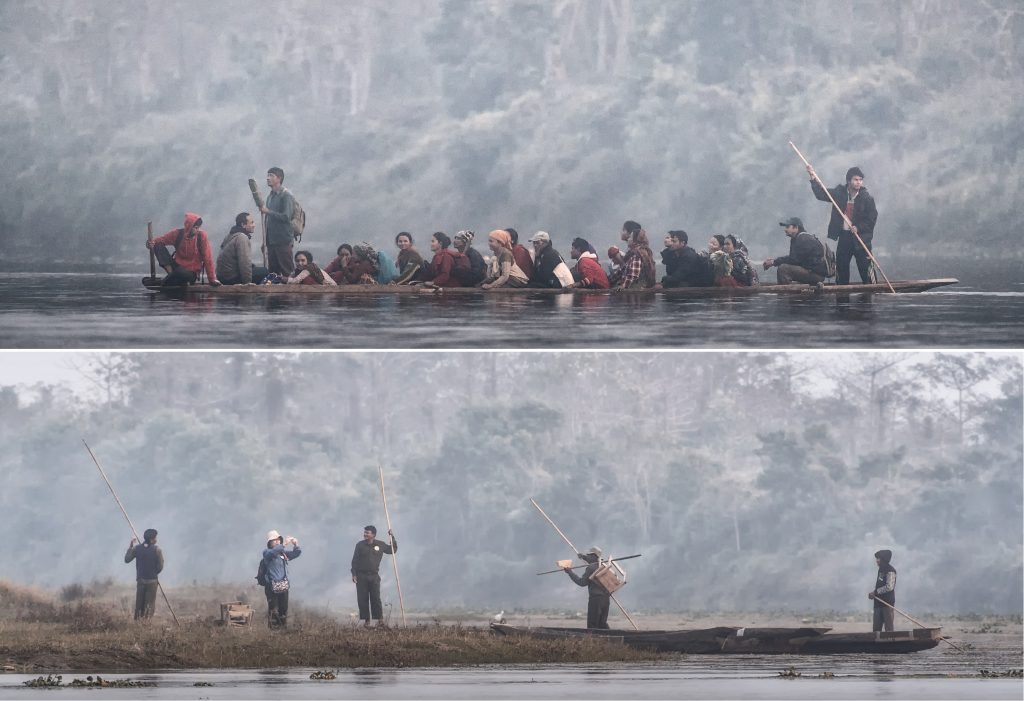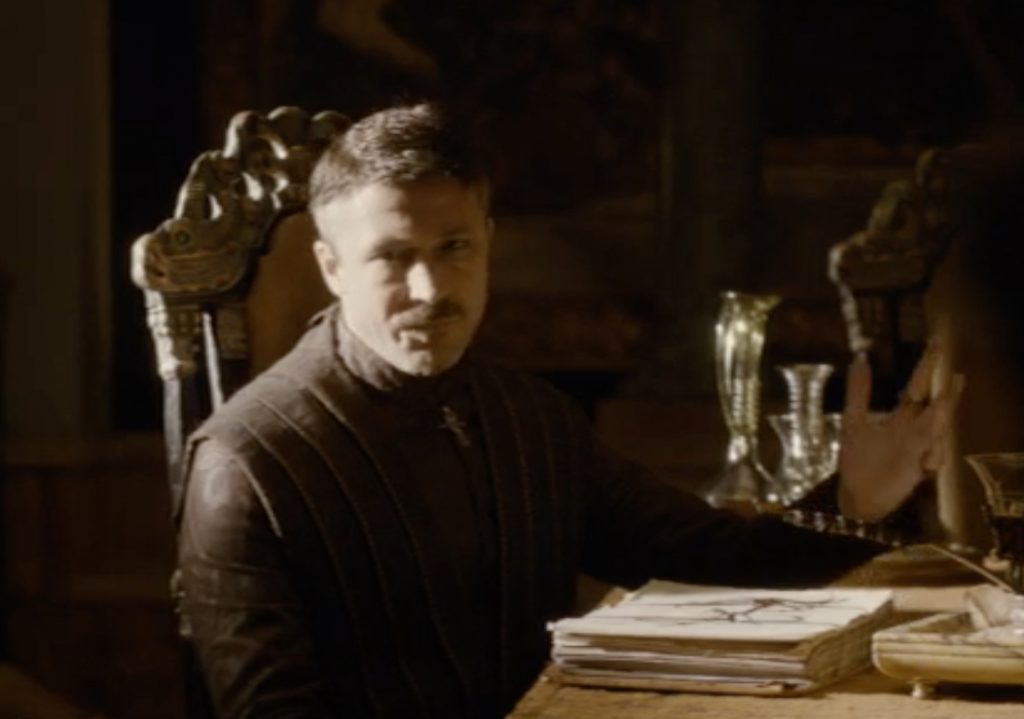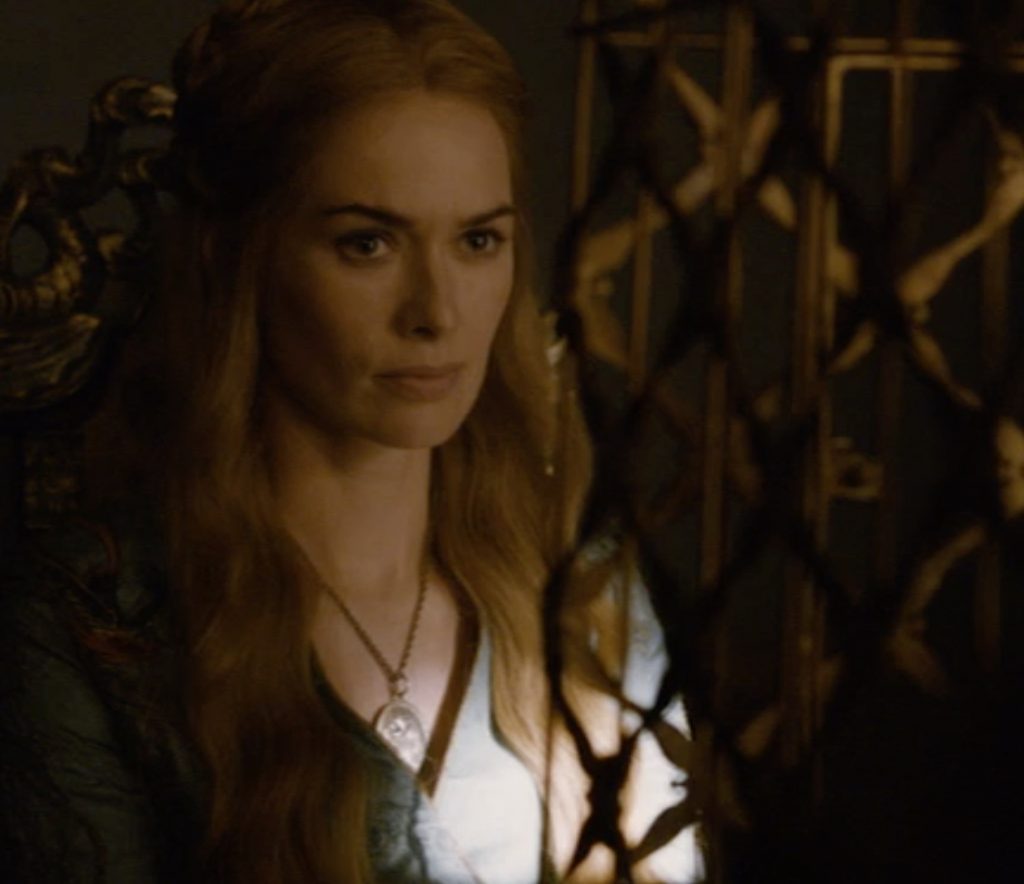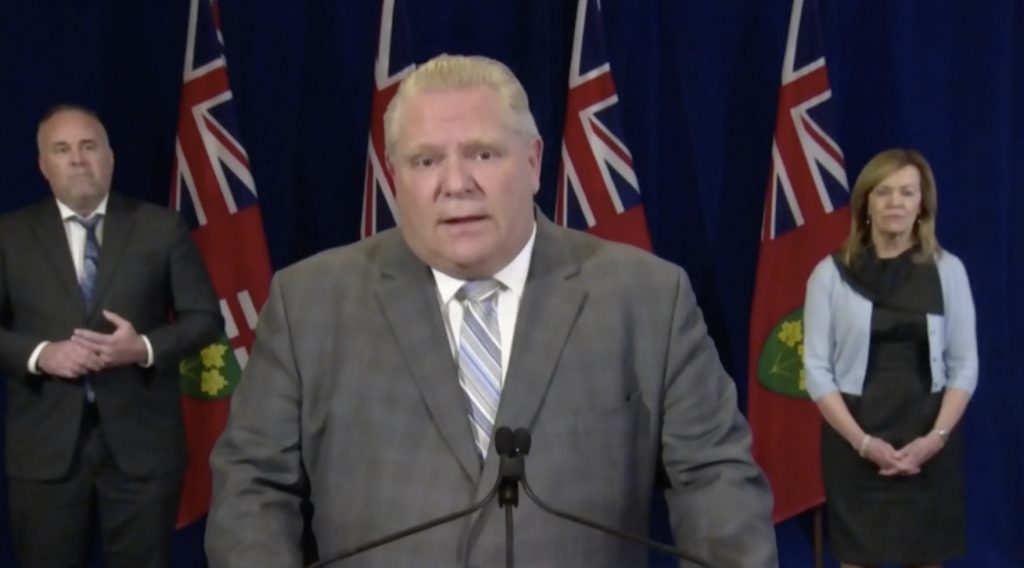The Ferry Ride
At the base of the Himalayan Mountains is Chitwan National Conservation Park, Nepal, a preserve of jungle, bogland and many lakes and rivers. A ferry serves two different groups of people crossing the narrow river next to one of the Tharu villages. One group is villagers commuting between home and work. In the top photo villagers are returning after a day of hard labour, each of them earning about a dollar for the day’s work. The second group using the ferry is tourists such as I.

What does one do with a photograph? Each of these photographs on its own could be appreciated for the particularity of the moment and the subject, and its rendering in light, detail, composition, line and form. Viewed together, they become something else for me, become a generalization, an allegory, a presage moralise´ even for current events in the course of this Covid-19 pandemic.
This diptych [1] illustrates for me the order of the world where 80% of the planet’s population lives on 20% of the planet’s resources and only 20% of the population, that is us, uses a full 80% of the earth’s resources to sustain our lifestyles. A disparity. Three men in the United States have a personal combined wealth equal to 160 million Americans, half the American population. The three men don’t see a problem with that. A bit of a twist: in fact, the society celebrates it. Note in the top photo that one ferryman is sufficient to ferry all the workers across the river. In the bottom photo, four men seem necessary to cater to the tourist. The tourist doesn’t realize this discrepancy so intent is she on getting a good photo.
In the TV show Game of Thrones, Season 2 [2], Cersei Lannister is chairing a meeting of elites of the Kingdom of Casterly Rock. They have just been notified the long Summer is over, finally, which means Winter is coming, expected also to be extraordinarily long.

Petyr Baelish reports that the kingdom has 5 years of wheat in store. Should the winter last longer and the food be more scarce, then he points out matter-of-factly, in five years we, the elite, shall eat but we will have fewer peasants.

It’s clear who will suffer. “Shut the gates [to the peasants and to the refugees]” instructs Cersei Lannister of her Commander of the City Watch. “They belong in the fields.” [3]
The American administration had said it would need to start up the economy by Easter to ensure market vibrancy even if that meant some people would have to die. The administration remained quite popular among the citizens. The population of black people in the U.S. has been hit hardest by the pandemic because many live in the poorest of conditions. It’s natural in a crisis for one to look after one’s own. In America, the government represents wealth, guards the interests of those with wealth. [4]
Of course, those who suffer most are the most vulnerable, yet in an ironic twist with Covid-19 in Canada, the vulnerable for their very vulnerability to the virus, have gained some power, a voice; suddenly they matter because they are dying in large numbers. The premier of Ontario held back tears on camera when speaking of those at risk in the Retirement Homes. [5]

It might seem self-serving, nonetheless, to hear some politicians abhor the desperate living conditions in long- term care homes and homeless shelters, conditions created by policies of those very politicians. The number of deaths from Covid-19, the vast majority in nursing homes, are of concern to the politicians, threaten the politicians’ popularity, interestingly, whose popularity only a few months ago was heralded proudly by bullying the weak, minorities, and marginalized, not by sympathizing with them. The government’s first act once assuming power in Ontario was to close safe injection sites for addicts. They felt, why should the Ontario taxpayer fork out to pay for someone else’s, the addict’s, dismal failure in life. Over the first year in office, the new Ontario government made multi-million dollar cuts, called efficiencies, and routed out protection for indigenous fisheries, legal aid for refugees and immigrants, flood management programs; cut library service in half; eliminated payments to victims of crime, eliminated free tuition for low-income students, eliminated after school programs and tutors for needy teens, eliminated thousands of teacher positions, eliminated funding for Indigenous culture, eliminated the watchdog commission for protecting French Language in Ontario, eliminated funding for a midwifery college; dissolved local public health networks and six public health agencies and proposed the same for 14 regional health agencies; broadened more use for unlicensed day care. [6] Hmmm.
Along with pronouncing their concern for the disenfranchised, I’ve noticed another shift in our politicians’ attitude with the advent of the pandemic. Another bit of a twist: at the outset, our provincial politicians were shell-shocked with the force of the pandemic, and found themselves needing to rely on expert advice which up to that point they had slighted and dismissed at every turn. Until Covid-19, the government had preferred its own ideological assertions, and had been openly dismissive of experts and readily had ignored their own civil servants’ research and recommendations in favour of the politicians’ own uninformed assumptions.
This was especially true when those experts threatened the electability of the politicians. Within their first year, for example, the current government closed down operations of the respected Environmental Commission which, for 25 years, had been monitoring how well the provincial government follows its own environmental laws. The current government didn’t want the advice of experts, scientists and lawyers of the Environmental Commission to tell the politicians what to do, especially with imminent release of a damning research report would show the government had dismally failed to uphold provincial environmental standards. Since this expert report was not going to help with the popularity and electability of the government, it was better to shut down the long-standing institution, fire the experts and bury their warnings in the minster’s office. The report about how poorly the government itself was failing to meet environmental standards is safely under the authority of the Minister of the Environment where it won’t harm anyone. The minister can now do whatever he wants to the environment; there’s no one left to tell him otherwise, or ensure Ontarians environmental rights and safety. [7]
Through the course of the pandemic, the politicians have been so grateful for the advice of the health experts to get them out of trouble, the premier being so profuse in compliments to Dr. Williams. But that tide is changing back again. With a bit of confidence, the Ontario government is starting to push people around, bully again. Ontario, compared with other provinces, has not managed very well the critical step of increased testing. On camera, the premier is visibly upset over the poor organization and efficiency of the Covid-19 testing as numbers fail to reach expectations. He has blamed the local municipal health authorities and says they need to pick it up, do a better job. In a typically bullying phrase, he said he’s not going to name names: they know who they are, and in a barely veiled threat he said he might just reorganize and centralize the whole system eliminating the local health authorities, that is fire them. Should he have checked, the premier would have discovered that the municipal authorities have stepped up in the breach of the crisis to help, but the provincial government is the one responsible for testing. The premier might consider the testing failure to be attributed to a failure of government policies slashing public health care budgets in January 2019, decimating the public health system. [8] Of course that’s no reason not to blame local authorities for the failure if it can make good political capital in front of the cameras. Accurate and considered analysis be damned. Back to the way things were before the pandemic.
In light of the wake-up call of the pandemic, a number of voices are speaking up suggesting society take advantage of this extraordinary time and not go back to the status quo. Former Green Party leader, Elizabeth May, says the oil industry is dead and that billions of dollars they will be asking for to revive, should be spent in Alberta on the renewable energy industry. Others are saying we need to use this chance to redesign our cities and how we live together. Experts for years have been saying our demeaning elder care policies need an overhaul; change is needed. Now is the time. Judges who for years have been reporting on the jail system as so bad it is outright abusive, State Abuse they say, are speaking up, hoping in the moment of this crisis they will finally witness the political will to change the jails. The list goes on. The disenfranchised –the vulnerable and powerless, research experts, professionals in their fields- are hoping to be heard, see a better society progress forward. Others want to return to how things have been, to return to a business-first and profit culture where child care and elder care, education, social service, public health and environmental responsibility need to be cut to the bone or eradicated or turned into a for-profit business with the promise the taxpayer has more money in her or his pocket. [9]
Where do we go from here? Backward or forward? Has this time taught us anything? That’s the question many people are pondering at this time.
I have to think it’s important to move forward but I feel that also means moving forward in the nature of our social discourse and how opposing sides treat each other. We might want to carry the Covid mantra forward: ‘in this together.’ I have wrestled with this writing for two weeks because writing direct criticism I felt for the government isn’t the focus I want for this blog. I’ve written a dozen pages and gone through ten drafts and wandered in circles unable to abandon the direct criticism as it seems front and central to my observations of Covid. I believe in accountability, but I also refuse to go on Twitter or FB and other social media platforms because the vindictive tone that feeds these sites is poison to me. I don’t want this piece to become part of the accepted invective torrent of our social discourse. Rant and rave and demean “the other side.” I have struggled with the balance and tone for this piece on Covid-19. I’m not sure I made it. No doubt to describe government policies as bullying is not building dialogue. Truth is the Ontario politicians likely want to do the right thing with their lives. Covid may be helping them to see what that is.
I went back then to reflect on the photograph to guide me. There’s no point telling the woman in the photograph that she’s a bad actor, be critical of her beliefs and attitude. Her perspective and ideology is her identity. To attack her beliefs as unwarranted is to attack her identity, and she won’t let go of her identity; she’ll fight for it to the bitter end. If instead of decrying each other, she and the villagers meet, find out about each other, approach each other with mutual respect, adopt an attitude of unconditional positive regard, act toward each other with dignity, dispense with spewing vitriol and malice, let it go, instead look for a bit of humanity in the other, then is some chance out of that, good can come. Not easy to do. Takes courage and patience and compassion. Means taking the first step, being the first one to offer a hand. Whether it be President Trump or Ontario politicians, leftist advocacy groups or the oil industry, or…instead of bashing the opponents back, as a different idea we could approach with kindness. Not to go after them, righteously, but find in the other a bit of beauty, see that, reflect their humanity back to them, and through some generosity of spirit, with finding one’s own humanity, discover that humanity also in the other. A bit of a twist on things. Being able to see a shimmer of humanity in each other, build on that shimmer of humanity, we can grow together, rise above the anger and hate and vitriol that only poisons us, destroys us. As we are telling ourselves now during the Covid-19 crisis: find a way to get through this Together.

References
Please note that my writing is reflective observation, most interested in observing the collective human journey, and does not assume scholarly or journalistic merit. I am most interested in the inner human journey, how we make our way to the end of life, trying to see into the world about us, so see ourselves not as we appear but as we are. With the more pointed critique and tone of the current Ontario government policies in this piece, I include references not to be comprehensive or assume fair-minded discussion, but provide some basis for my reflective observations. In light of these more politically slanted observations, I would take my cue from journalist Robert Fisk who has been accused of being both pro and anti of every ideology in the Middle East and who answers back that for him journalism is simply to question authority, any authority, and if taking a side, to take the side of the suffering, voiceless, disenfranchised. (Film about Robert Fisk, ‘This is Not a Movie’ https://boxoffice.hotdocs.ca/websales/pages/info.aspx?evtinfo=125578~fff311b7-cdad-4e14-9ae4-a9905e1b9cb0&epguid=8533b035-0c76-4133-bf01-9b9878c87b37& ) A perspective for the writing I’m trying to pursue is to look into my own humanity and appreciate the humanity in all of us, recognizing the shadow we all carry, perhaps then to imagine ourselves a part of something more than ourselves, belonging to each other, connected, and so live more in grace and awe, live with meaning, respectful of the shared life we’ve been given. That perspective I wish to focus on.
1. Photographed December 30, 2013 and exhibited in my photo viewing, Rural Nepalese, May 15 -29, 2016, Opening event was May 15, 2016.
2. Game of Thrones, Season 2 Episode 1, 6’20”+
3. It reminds me of the Irish potato famine that went on for 7 years. Peasants were living on 8 meals a month. A million died. A million became refugees. The rest, even children, were described as ghostly grey in appearance, wretched shadows of human life wandering the roads. They had lived on the potato and didn’t have enough money to buy corn or grain. Throughout those seven years, cattle, corn, wheat, peas, honey, beans, rabbit, fish in abundance were being shipped from Irish farms and fisheries to England to benefit its economy all the while Irish people suffered severe malnutrition, a million starving to death.
4. https://www.cnn.com/2020/03/24/politics/trump-easter-economy-coronavirus/index.html
6. https://www.chatelaine.com/living/politics/doug-ford-cuts/
https://www.cbc.ca/news/canada/toronto/ont-municipal-funding-1.5251772
https://www.huffingtonpost.ca/entry/elizabeth-may-oil-is-dead_ca_5eb317dcc5b652c56471dd49
https://www.dundurn.com/books/Sport-and-Prey-Capitalists
9 There is much fascinating discussion at the fore about how we can be a better society and world for each other and future generations after the lessons of Covid-19. Of the many discussions, I provide links to two eminent scholars who can set the stage for opposing directions we could be following post-Covid.
Prof Paul Rogers, The World Can’t Afford to be the Same Again after Covid-19 https://www.cbc.ca/radio/thesundayedition/the-sunday-edition-for-march-29-2020-1.5509908/the-world-can-t-afford-to-be-the-same-again-after-covid-19-says-peace-and-security-expert-1.5509943
Thomas Piketty, Political risks in the aftermath of Covid-19 https://www.cbc.ca/radio/thecurrent/the-current-for-april-21-2020-1.5538630/pandemic-could-prompt-swing-to-nationalist-politics-says-economist-thomas-piketty-1.5539538
Dr. Paul Farmer: We’re Not Doing enough for the Most Vulnerable https://www.cbc.ca/radio/ideas/we-re-not-doing-enough-doctor-urges-equal-health-care-for-the-most-vulnerable-1.5552347
The Elite Charade of Changing the World, Anand Giriharadas https://www.cbc.ca/radio/ideas/how-elite-docbc%20the%20sunday%20edition-gooders-fixing-the-world-are-part-of-the-problem-anand-giridharadas-1.5441573
Capital in the 21st Century (film) Thomas Piketty https://boxoffice.hotdocs.ca/websales/pages/info.aspx?evtinfo=122255~fff311b7-cdad-4e14-9ae4-a9905e1b9cb0&